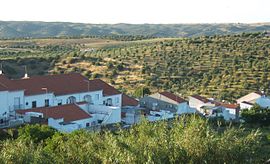Our website is made possible by displaying online advertisements to our visitors.
Please consider supporting us by disabling your ad blocker.
Moura, Portugal
Moura | |
|---|---|
 | |
 | |
| Coordinates: 38°08′N 7°27′W / 38.133°N 7.450°W | |
| Country | |
| Region | Alentejo |
| Intermunic. comm. | Baixo Alentejo |
| District | Beja |
| Parishes | 8 |
| Government | |
| • President | Santiago Macias (CDU) |
| Area | |
• Total | 958.46 km2 (370.06 sq mi) |
| Population (2021) | |
• Total | 13,258 |
| • Density | 14/km2 (36/sq mi) |
| Time zone | UTC+00:00 (WET) |
| • Summer (DST) | UTC+01:00 (WEST) |
| Local holiday | Saint John June 24 |
| Website | www |
Moura (European Portuguese pronunciation: [ˈmoɾɐ] ⓘ) is a city and a municipality in the District of Beja in Portugal, subdivided into 5 freguesias. The population in 2021 was 13,258,[1] in an area of 958.46 square kilometres (370.06 sq mi).[2] The city itself had a population of 8,459 in 2001.[3] It has now around 11,000 inhabitants.
The current mayor is José Pós de Mina, elected by the Unitary Democratic Coalition. The municipal holiday is 24 June.
It is home to Moura Photovoltaic Power Station, one of Europe's largest solar-power facilities and the Castle of Moura.
There are two wine regions within the borders of Moura municipality: Moura centered around the town of Moura and Granja-Amareleja within the parishes of Amareleja, Póvoa de São Miguel and part of Santo Amador and São João Baptista.[4][5]
- ^ INE (2021). "Censos". Instituto Nacional de Estatística. Retrieved 2025-01-27.
- ^ "Áreas das freguesias, concelhos, distritos e país". Archived from the original on 2018-11-05. Retrieved 2018-11-05.
- ^ UMA POPULAÇÃO QUE SE URBANIZA, Uma avaliação recente - Cidades, 2004 Nuno Pires Soares, Instituto Geográfico Português (Geographic Institute of Portugal)
- ^ "DOP Alentejo - Moura". IVV. Retrieved 2025-01-27.
- ^ "DOP Alentejo - Granja-Amareleja". IVV. Retrieved 2025-01-27.
Previous Page Next Page




